
Retailers sign up to accord on Bangladesh factory standards
Dhaka complex collapse prompts big clothing brands to get behind accord on plant standards
Labour umbrella groups Industrial Global Union and UNI Global Union yesterday praised top retailers for joining their drive to make Bangladesh's garment factories safer, after 1,127 people died in a factory collapse last month.
"This accord is a turning point. We are putting in place rules that mark the end of the race to the bottom in the global supply chain," UNI Global Union's head Philip Jennings said in a statement.
The two Swiss-based union federations - whose combined global membership numbers 70 million - have worked for years to craft an accord with Western retailers to improve shocking factory conditions.
Their efforts were given greater urgency by the April 24 disaster in which the nine-storey Rana Plaza factory complex crumbled in one of the world's worst industrial disasters.
The deal compels retailers to hold independent building and fire safety inspections - in a country which has some 60 official inspectors despite needing hundreds - and to pay for repairs.
Bangladesh is the world's second-biggest apparel-making country and the US$20 billion industry, which relies on women workers, accounts for up to 80 per cent of exports.
While the accord applies only to Bangladesh, the spotlight yesterday was on Cambodia, where a shoe factory collapse killed two, spurring a government vow to inspect all plants.
The full list of signatories released yesterday was: H&M, Inditex, C&A, PVH, Tchibo, Tesco, Marks & Spencer, Primark, El Corte Ingles, jbc, Mango, Carrefour, KiK, Helly Hansen, G-Star, Aldi, New Look, Mothercare, Loblaws, Sainsbury's, Benetton, N Brown Group, Stockmann, WE Europe, Esprit, Rewe, Next, Lidl, Hess Natur, Switcher, and Abercrombie & Fitch.
"The companies who signed up are to be applauded," said Jyrki Raina, general secretary of IndustriALL Global Union. "We are talking improving the working conditions and lives of some of the most exploited workers in the world, earning US$38 a month in dangerous conditions."
Western retailers rely on cheap labour in Bangladesh, where safety standards are often poor and many employers ride roughshod over workers' rights.
Jennings, meanwhile, criticised US firms Walmart and Gap for not joining in.
"Walmart, the world's largest retailer, is out of step. By not signing up the Walmart brand sinks to a new low. Equally Gap's refusal to join is a mistake that shoppers will not forget," he said.
